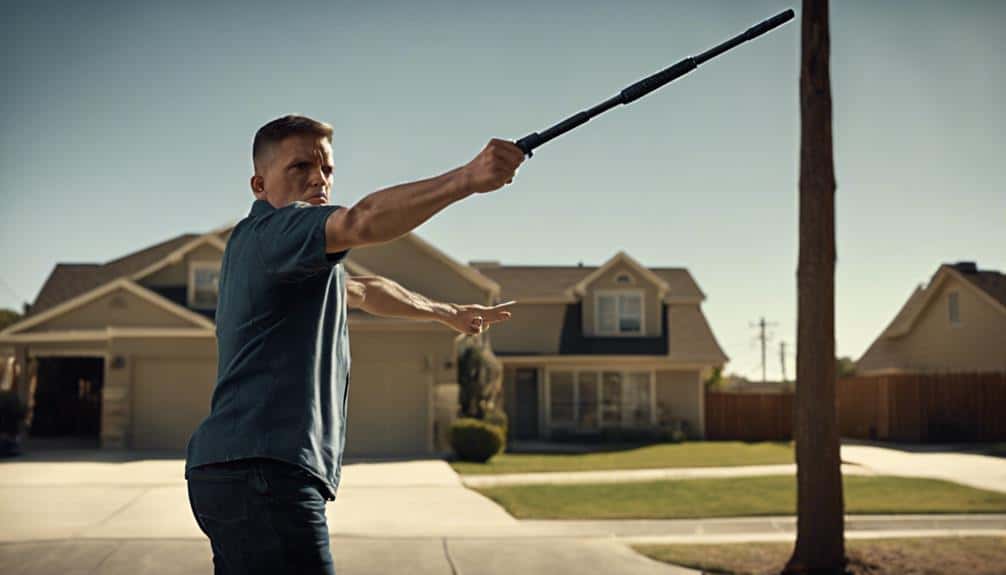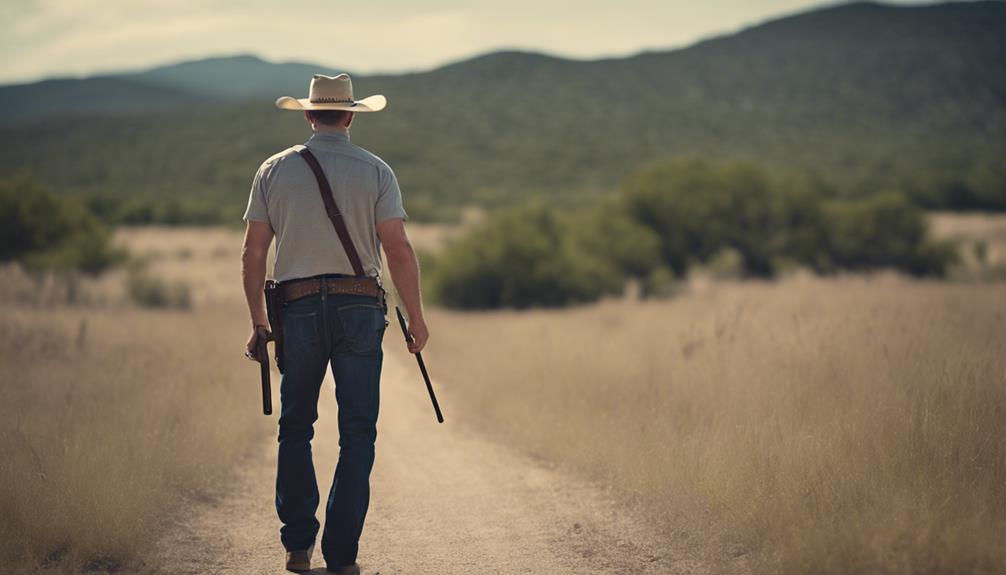Yes, you can carry an
extendable baton in Texas for
self-defense and you don’t even need a permit! Picture yourself confidently walking downtown, an
extendable baton tucked discreetly on your hip. But, hold up—you can’t bring it to schools, courthouses, or polling places, so don’t try showing off your baton skills there unless you’re itching for a felony or misdemeanor. Feel like a hero with proper training, and make sure you know all the
local ordinances to avoid any nasty surprises. Curious about the nitty-gritty details of
responsible carry and what not to do with your baton? You’re in for a treat!
Legal Status of Extendable Batons
Carrying an
extendable baton in
Texas has been
legal since September 1, 2019, for
self-defense purposes without needing a permit. That’s right, you don’t need to jump through hoops to keep yourself safe. It’s like Texas gave you a high-five and said, ‘Go ahead, protect yourself!’ These batons are non-lethal tools that you can use when things get dicey, but remember, it’s all about
proportionality—don’t go overboard.
Now, even though it’s legal to carry these batons, you’ve got to play by the rules. Texas law allows them in most public spaces, but
local regulations can throw a wrench in your plans. Some places, like schools and government buildings, are strict no-go zones. Think of them as baton-free islands in a sea of freedom.
To be a responsible owner, you should get some
proper training. Swinging a baton around without knowing what you’re doing? Not a good look. Training helps you use it effectively and safely. And hey, it’s not just about being legal; it’s about knowing when and how to use it.
Restrictions and Prohibited Areas
In Texas, you can’t bring an
extendable baton into
specific areas like schools, courthouses, and polling places without facing
legal consequences. While extendable batons are legal for
self-defense, restrictions kick in when you enter these prohibited areas.
For instance, carrying one into a
school safety zone isn’t just a bad idea—it’s a one-way ticket to a
third-degree felony. That’s right, a simple walk through a school zone with a baton can land you in serious trouble.
Courthouses and polling places are also off-limits. Violating these restrictions can result in a
Class C misdemeanor. You might think, ‘It’s just a baton, what’s the big deal?’ But trust me, the law doesn’t see it that way. The legal system takes these rules seriously to guarantee
public safety.
Additionally, don’t forget about local municipal ordinances. Some cities have their own restrictions, so you need to be aware of those as well.
Always make certain you understand the lawful use of your extendable baton. It’s not just about having the right to carry one, but knowing where and when you can do so without risking your freedom.
Self-Defense and Use of Force
Understanding how to properly use an
extendable baton for
self-defense guarantees you’re both effective and within the bounds of the law.
In Texas, carrying an extendable baton is perfectly
legal, but you need to know how to use it right. It’s a legal self-defense tool, not a toy, and should only come out when you’re facing a real threat. You must stick to the principle of
proportionality, meaning if someone’s just yelling at you, you can’t start swinging your baton like a superhero.
Misuse can land you in hot water, leading to criminal charges or civil liability. Imagine facing more trouble than the person who threatened you—no one wants that! This is why
proper training is essential. Knowing how to handle it effectively can keep you safe and reduce the risk of injury during confrontations.
Also, don’t forget about
local regulations. Some places, like school safety zones, might have strict rules about carrying an extendable baton. Always check to avoid any nasty surprises.
Penalties for Misuse
Misusing an extendable baton in Texas can lead to serious legal consequences, including criminal charges and civil liability. If you think you can just whip out your baton anytime you want, think again! Using it outside of self-defense can land you in hot water. Here’s how:
- Criminal Charges: If you use your baton in a prohibited area, like a school zone, you could face charges that escalate to a third-degree felony. That’s no slap on the wrist!
- Civil Liability: Injuring someone with your baton can result in civil lawsuits. You might end up paying hefty financial penalties if found liable for those injuries.
- Class C Misdemeanor: Carrying your baton in restricted areas, such as courthouses or schools, can get you charged with a Class C misdemeanor, which could escalate under certain conditions.
Additionally, if you misuse your baton during a confrontation, you might face assault charges, leading to potential jail time and fines.
And don’t even think about improper storage or transport; getting caught with it in your vehicle the wrong way can result in charges of illegal carrying of a weapon.
Tips for Responsible Carry
Carrying an extendable baton responsibly in Texas requires a solid understanding of state laws and a commitment to using it only for self-defense. It’s not enough to just have one; you need to be aware of where you can and can’t carry it. For instance, school safety zones might have restrictions on possession.
First off, keep your baton concealed to avoid unwanted attention and misunderstandings in public spaces. Concealed carry is key—no one needs to see you wielding it unless absolutely necessary. Also, stay on top of local regulations since different municipalities might have their own rules about carrying self-defense items.
| Tip |
Description |
Importance |
| Know the Law |
Understand state and local regulations |
Avoid legal trouble |
| Concealment |
Keep the baton hidden in public spaces |
Prevent misunderstandings |
| Regular Practice |
Train regularly to handle the baton effectively |
Guarantee safe use |
| De-escalation |
Always try to defuse situations before resorting to physical defense |
Minimize conflicts |
Practicing how to handle your baton is essential. You don’t want your first time using it to be in a high-stress situation. And remember, always aim for de-escalation first. Your baton is there as a last resort for self-defense, not as a go-to solution for every problem.
Frequently Asked Questions
Are Expandable Batons Illegal in Texas?
Expandable baton laws in Texas allow you to carry them for personal safety without a permit, but training requirements and usage restrictions apply. Ignoring police regulations or legal consequences can impact public perception and your right to concealed carry.
Can I Own an Extendable Baton?
You can own an extendable baton. Texas baton ownership laws permit it as a self-defense tool. Confirm you follow personal protection regulations, understand legal weapon classifications, and consider self-defense training. Be mindful of public safety concerns and storage guidelines.
What Self-Defense Weapons Are Legal in Texas?
You can carry various legal weapons in Texas for personal protection. Self-defense laws allow concealed carry and open carry of non-lethal options like
pepper spray, batons, and more. Consider self-defense training for effective use in self-defense scenarios.
Is a Kubotan Legal in Texas?
Yes, a
Kubotan is legal in Texas for personal safety. However, make sure your Kubotan use aligns with self-defense legality. Understand weapon classifications, legal restrictions, and get self-defense training to use this martial arts tool responsibly.







